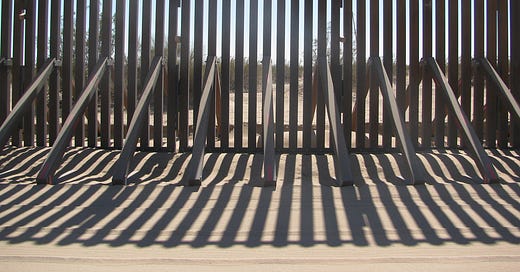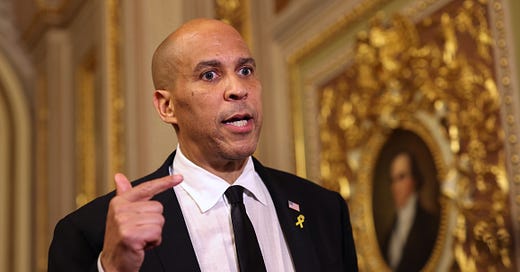Why Trump Can’t Cut a Deal and Declare Victory on the Wall
The ‘national emergency’ gambit is a desperation move. But what else can he do?
Most reporters don’t spend too much time worrying whether one of their questions could provoke a constitutional crisis. But after President Donald Trump’s freewheeling shutdown press conference in the Rose Garden on Friday, ABC News’ Terry Moran might have to. When the president had finished his latest freestyle on the absolute necessity of a border wall and his unwavering dedication to keeping the government shut down until he got it, Moran asked his question: “Have you considered using emergency powers to grant yourself authorities to build this wall without congressional approval?” Trump barely let him finish: “Yes, I have. And I can do it if I want. We could call a national emergency and do it very quickly.”
In the moment, some dismissed the response as momentary braggadocio, a ham-handed attempt to increase his negotiating leverage over Democrats. After all, if Trump really believes he can legally snap his fingers and order an emergency border wall, why hasn’t he done so at any point in the last two years, or in the two weeks since the government shut down? But once an idea has sparked Trump’s interest, he has a habit of letting it fester. And so it is that the White House is reportedly meeting with federal agencies to discuss whether such an explosive move might just be crazy enough to work.
It’s hard to overstate the chaos that would ensue should Trump so attempt to brute-force his wall into existence. Under the National Emergencies Act of 1976, Congress has the power to overrule presidential emergency declarations; Democrats newly revested with control of the House would surely waste no time in forcing such a vote. Imagine every elected Republican, House and Senate, being forced to cast a vote either to repudiate President Trump’s signature issue or to rubber-stamp one of the most outrageous executive power grabs in modern U.S. history. The thought’s enough to make even Nancy Pelosi drool.
Nevertheless, it’s impossible to rule out that Trump might take the shot anyway. And that’s because this shutdown over the border wall represents a unique set of contradictory incentives for the president.
Much of adversarial media coverage of President Trump over the past two years has obscured the fact that he is not himself, for the most part, a hard-right ideologue. Rather, he’s a canny marketer who appreciates the degree to which he is politically beholden to a core support group of hard-right ideologues. (To that group, of course, this has always been his central appeal.) As such, he is generally less in the business of bringing about change than he is of convincing his supporters that he is busily working to do so.
It’s this fact, coupled with the unprecedented way many of his supporters have elected to take his every word as gospel, that has allowed him to cash in on some very lazy accomplishments. Perhaps the clearest example of this was his long, laborious NAFTA renegotiation—after two years of bitter negotiations over the agreement he savaged repeatedly as one of the worst in history, he suddenly signed off on the same deal with marginal tweaks, declared victory, and moved on. But immigration is different. It’s the one issue his base won’t budge on.
Up to this point, Trump has tried to take his preferred strategy as he negotiates the shutdown. He’s talked a big game: trolling his opponents by pointing out that most of the federal workers twisting in the wind are Democrats, thundering that he’s perfectly content to keep things in limbo for years. Meanwhile, behind the scenes, he’s deployed Vice President Mike Pence and son-in-law Jared Kushner to try to deal with congressional Democrats, and the shaky outlines of a potential compromise have started to take shape—maybe a little less money for now, say, and a path to legal status for former DACA recipients to sweeten the deal.
The only problem: The immigration hardliners who were Trump’s earliest and most enthusiastic supporters aren’t too interested in accepting a pale imitation of the immigration crackdown Trump promised. So each new report of a potential concession from the White House has prompted a new round of grousing both from pundits like Ann Coulter and Mickey Kaus and from groups like the Center for Immigration Studies. The president cops to the danger—what’s the point of a wall deal if my immigration supporters aren’t satisfied with it?—and lurches away, upending the process all over again.
As things stand, then, Trump is transfixed between inexorable forces: Democrats led by Nancy Pelosi, who insists that a wall is 1) immoral and 2) not happening; and immigration hardliners who won’t buy any plan Democrats might sign off on. By refusing any deal that congressional leaders presented him before the shutdown, Trump signaled that the group he’s most stuck with is the hardliners. Which means this can end only one of three ways: Democrats unexpectedly buckle, or Republicans defect from the president in sufficient numbers to override his likely veto of a plan that did not include wall funding, or Trump tries to blow it all up with a national emergency. Who by now would be so naïve as to think option three is the least plausible?











